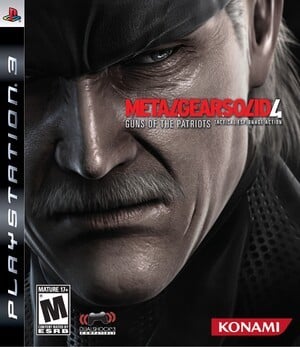
With PlayStation 3 now the ripe old age of five years old in Europe, a small group of the Push Square team decided to get together and chat about the system. We talk about difficult beginnings, its recovery and emergence, and contemplate its future legacy.
Joining features editor Thomas Whitehead are associate editor Sammy Barker, assistant editor Mike Mason and U.S. reviewer Chris Ingram. There's a lot to talk about, so grab a comfortable seat and join us for a conversation on all things PS3.
Thomas Whitehead: First up, please introduce yourselves to the readers.
Sammy Barker: Hello everyone, I'm Sammy, associate editor at Push Square.
Mike Mason: Hello everybody, I'm Mike Mason; Push Square assistant editor, Katamari king, alleged SingStar champion.
Chris Ingram: Hi, I’m Chris Ingram and I’m one of the U.S. Reviewers.
Thomas Whitehead: First question: how did you react when PS3 was announced, considering its feature set and the amazing success of its predecessor?
Sammy Barker: It's such a long time ago it's hard to really remember. I recall Sony's E3 conferences being really boring at the time, but the potential Sony was promising always sounded incredible. I'll never forget the Killzone 2 "target" trailer: everyone went nuts for that thing. It was a rocky road up to release though.
Chris Ingram: Honestly, I was like “I’m not sure if I even want to spend that much for a gaming console.” At the time I was single and making a lot of money, and spent a lot of money playing with expensive toys (crotch-rockets, cars, etc.), but I still waited about a year before I finally gave in and bought a PS3 – crazy considering how big of a PlayStation fan I am.
Mike Mason: Honestly, pre-release all I can really remember is the infamous E3 fiasco ($599 price announcement). I was curious about Blu-ray, but I was still more than happy with my PS2 at that time; I was a bit late to the PS3 party. I remember playing Ridge Racer before launch and thinking it looked great, though.
Thomas Whitehead: How significant were the mis-steps with pricing and, initially, supply. Do you think it damaged Sony's standing with some gamers in the early days?
Chris Ingram: Yeah, I actually do. The price tag really made people sit down and think about their gaming habits and how much it’s worth to them. It also segregated PS3 gamers into a small niche from the beginning – not something a console needs to do when trying to gain mass-market appeal.
Mike Mason: The E3 unveiling was such a dramatic, undeserving entrance for what turned out to be a fantastic console. It took a while for Sony to shake that off.
Sammy Barker: I think its still fighting to recover from it today. Sony really did seem to get everything wrong at launch — and I say that as a massive fan.
Mike Mason: I think it only really started to surpass it properly with the relaunch and redesign.
Thomas Whitehead: What do you think caused that? Arrogance, honest mistakes, bad luck?
Sammy Barker: I think a mixture of all three. Sony really misunderstood both Microsoft and Nintendo's place in the market, and I think it was a grave error.
Mike Mason: It overestimated just how important its system was and underestimated the importance of Nintendo's non-gamer strategy — which Sony itself had plundered in the past with SingStar and Buzz! — and how serious Microsoft were about taking the throne.
Chris Ingram: I’m sure there’s a good underlining of arrogance here, but it does cost money to push the market forward and in the end it has paid off for Sony, which is something it’s aimed for since the beginning. The worldwide economy taking a dive bomb after launch, well that boils down to bad luck in my opinion.
Sammy Barker: I think the media too was quick to kick Sony when it was down. It'd been dominant for so long, I feel like some outlets were calling for change.

Mike Mason: Two generations and you're out. Nintendo is still feeling something to that effect even in the face of its success this last generation.
Thomas Whitehead: It's been argued, as well, that the games catalogue started very slowly. Is that fair, or were gamers and the media expecting too much?
Sammy Barker: You can never ask for too much, right?
Mike Mason: The launch was not great as I recall. There was definitely a lack of killer punches early on; part of the reason I hopped on the train late.
Chris Ingram: Outside of MotorStorm, launch titles didn’t show off anything to justify the price, and the poor third party ports the PS3 was getting at the time was an even better reason to not invest in the high launch price. It wasn’t until Uncharted: Drake’s Fortune and Metal Gear Solid 4: Guns of the Patriots landed that I absolutely had to have a PS3.
Sammy Barker: Honestly, there's a lot of excitement about Phil Harrison joining Microsoft right now, but I think Sony's first-party content has improved dramatically since Shuhei Yoshida took the reigns.
Thomas Whitehead: Do you think complaints about the launch titles really reflected dissatisfaction with the pricing?
Mike Mason: Well there were a lot of ports, for one thing.
Sammy Barker: I think the problem is they didn't feel like a step up. Resistance is a great game — but it didn't blow the doors off like Sony was promising. And third-party content was poor, like Mike says.
Thomas Whitehead: When I first saw the PS3 price, I genuinely thought it was a typo. I think it elevated expectations unreasonably.
Mike Mason: Everybody expected more than it was because of that price.
Sammy Barker: But, to be fair, it was a crazy machine. The amount of tech packed into that original system was CRAZY.
Thomas Whitehead: But surely people wanted games, which Xbox (and Wii, in its way) delivered at a lower price?
Sammy Barker: Absolutely Tom. Sony got it wrong. Ken Kutaragi had too much power at that stage and, while the system was fairly priced for what it offered, the market just didn't want that much stuff. Not at that price anyway.
Mike Mason: It's quite funny that it fell into the same trap that it had set itself years earlier though, watching as SEGA launched Saturn at a mad price. Sony let Microsoft get too big a head start, too. Xbox 360 was starting to hit its stride as PS3 was arriving.
Thomas Whitehead: So obviously Sony needed big changes to revive the PS3. How vital was the Slim remodel, and should they have done it even sooner?
Behind the scenes the PSN was changing a lot. Sony released 13 firmware updates in 2008 and several more in 2009. Those all helped make the system feel more 'modern'.
Sammy Barker: I don't think it could do it sooner, but that GamesCom press conference (where Sony announced the Slim) was the turning point for me. New price-point, new branding and Uncharted 2 was just on the horizon. It was huge for Sony.
Mike Mason: The Slim model is what saved PlayStation 3 in my eyes, definitely. That was actually when I jumped in; it really seemed like it had worked everything out and was setting out to retake what it'd lost.
Thomas Whitehead: I would argue that the first model really represented two lost years, but the recovery with the Slim has been quite impressive, considering.
Sammy Barker: It's worth noting that behind the scenes the PSN was changing a lot. Sony released 13 firmware updates in 2008 and several more in 2009. Those all helped make the system feel more "modern". (Arguably like it should have at launch.)
I always wonder when people look back at the PS3 will they remember the terrible launch, or the incredible recovery?
Chris Ingram: I don’t think the Slim design was the saving grace for the PS3, because the sales numbers were dramatically improving before it. What it desperately needed, it received before the redesign, and that was games and a price drop. Also, the falling prices of HDTV’s and HDMI cables were another major factor here too.
Mike Mason: I don't know the figures, but PS3 isn't worlds away in terms of sales anymore, is it?
Sammy Barker: It's a couple of million I believe Mike. Splitting hairs at this stage.
Thomas Whitehead: It's ahead of Xbox, I think? Or they predict it will be. Wii still thrashed both of the HD systems, which is surprising in the sense of how old-fashioned its tech is.

Mike Mason: On Sammy’s point, I think the launch is something that should be remembered, just so it isn't repeated. But we've got to be beyond that by now, surely? I think people will remember PS3 for titles like Uncharted 2, and the interesting smaller games like Journey.
Sammy Barker: I hope so.
Mike Mason: There are so many great titles that are only on PS3; it'd be a shame to think that they'd be forgotten because of some years-old mistakes.
Thomas Whitehead: What did you guys make of the removal of PS2 backwards compatibility, a move that Nintendo has eventually copied with Wii. Was it really necessary?
Sammy Barker: People exaggerate the importance of backwards compatibility in my opinion. Sure it's nice in those barren early months, but it's quickly forgotten. Besides, Sony (and other publishers) found a new revenue stream in HD remasters. Which I love.
Chris Ingram: I didn’t care. I’m not an advocate of the ‘we have to have backwards compatibility’ movements, but yes it was necessary, or Sony likely wouldn’t have been able to drop the price as early as it did.
Mike Mason: I never owned a PS3 while they still did backwards compatibility, but I was disappointed when it was removed. It's not crucial, as Sammy says, but it would have been nice to have been able to play Gitaroo Man without dragging the PS2 back out.
Sammy Barker: Gitaroo Man HD remaster — make it happen!
Mike Mason: Yes. Absolutely yes! It's a convenience thing for me; I love backwards compatibility where possible.
Thomas Whitehead: Let's move onto a point raised by Sammy: System Updates. How good a job, or not, has Sony done in improving the system, and has it been important in helping the system to evolve?

Chris Ingram: I was around before back before the XMB and PlayStation Home were even thought about and I’ve seen the PS3 come to life because of the updates, so it’s hard for me to complain. It’s improved ten-fold since launch.
Sammy Barker: The process of updating the system itself is terrible, but the PSN has come so far. It's practically a different system these days.
Thomas Whitehead: Ah yes, the 'system update game'. You should review it Sammy!
Sammy Barker: It'd get a 3/10.
Mike Mason: It is a bit of a running joke, the amount of system updates. But yeah, they've improved the system a lot.
Sammy Barker: I remember before there was in-game XMB and Trophies — things the system should have shipped with. The good news is Sony learned and (fairly) quickly responded.
Mike Mason: Sony recognised that and sorted it, though, so that's some credit to it at least.
Sammy Barker: Exactly, and you can see the fruits of all that effort in the PS Vita. You can tell Sony really understands this stuff now.


Comments 3
Great article! Thanks.
I agree with them, The PS3 to me is like a high end car, expensive and not for everyone. But people who have it can enjoy what it have to offer that can not be found on any other. I use to think that Backward compatiblity was important to me for ps1 and PS2 games, but since owning the 60gb launch ps3, I think only used the backward compatibility 4 times. What excites me is that the potential the ps3 still have as a console and a multimedia device. Developers are just barely scratching the PS3 potential in terms of graphics.
I love my PS3, and it has been everything my 360 was not (reliable, fantastic first party games)BUT I knew Nintendo was going to own this gen the second I saw the Wii Remote in action. I doubted them with the DS (untill I got one) and once I saw the success it was having I just new the Wii would repeat that success and bring The big N back to the forefront of home console gaming. Wii U I am not so sure about, but I am still looking forward to owning one...As far as Ps4 goes I am ready for the fun. Sony has shown that there first Party is stronger then ever and I cant wait.
PS Legend of Dragoon 2 please.
Show Comments
Leave A Comment
Hold on there, you need to login to post a comment...